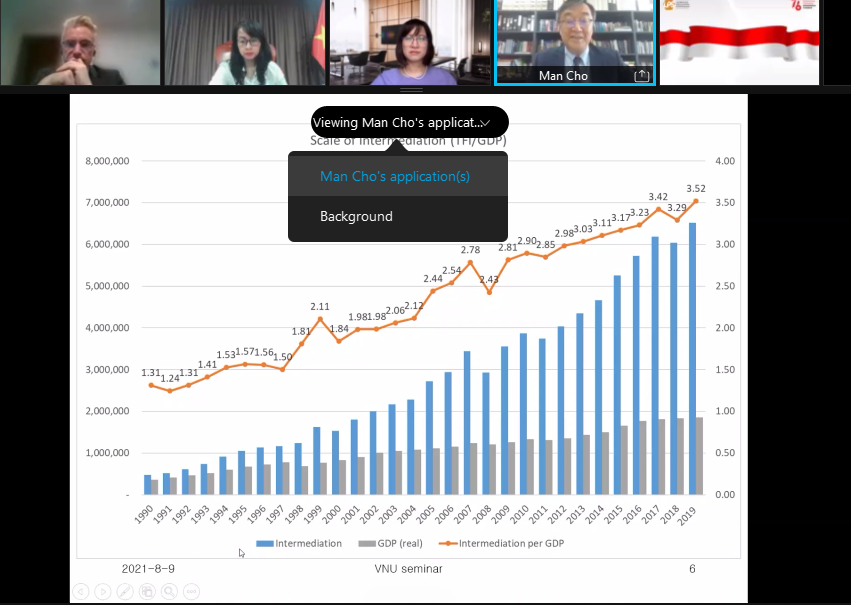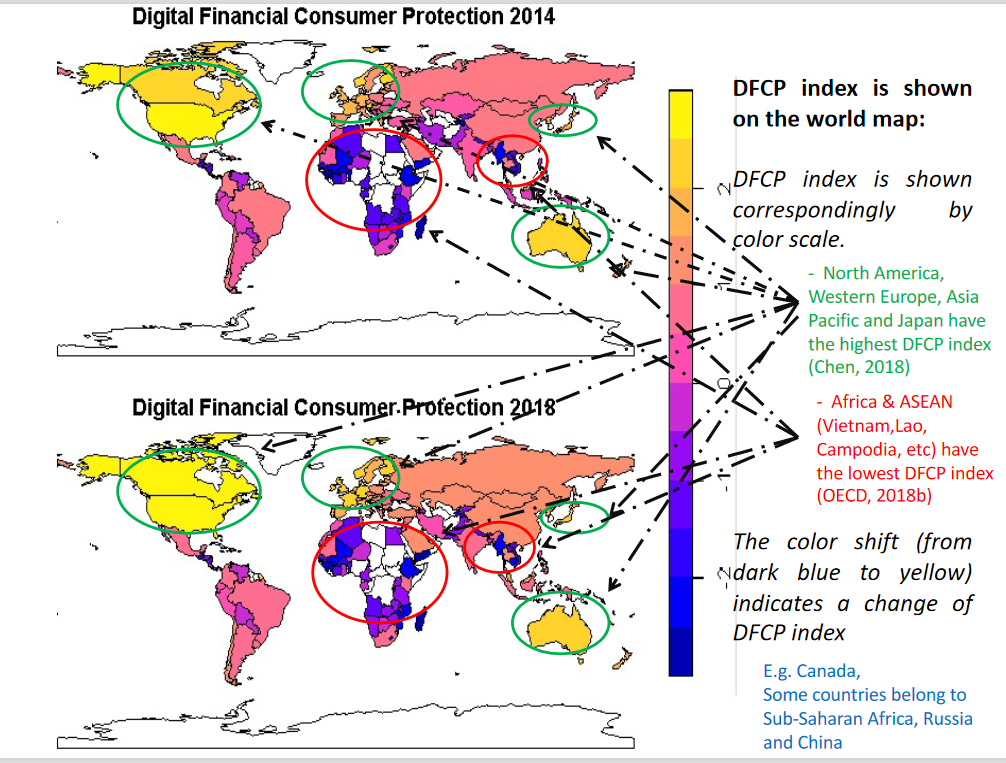On August 9, 2021, the international conference was co-organized by VNU University of Economics and Business and Baoviet Holdings, with the theme of "Financial Consumer Protection: Practices and Policy Recommendations for Vietnam" attracting more than 200 domestic and international guests. In recent years, Vietnam has seen a remarkable development in terms of quality, quantity, and accessibility of financial products and services. This requires not only efforts from financial service providers or consumer awareness raising, but also the involvement of regulatory agencies in formulating and enacting practical, efficient policies to meet the requirements in the context of Vietnam's rapidly developing new financial services. As a result of this, the international conference titled of "Financial consumer protection - Practices and policy recommendations for Vietnam," was co-organized by the University of Economics - Vietnam National University, Hanoi. (VNU) and Vietnam Deposit Insurance on August 9, 2021, with over 200 domestic and international guests registered.
The conference is
sponsored by the National Foundation for Science and Technology Development
(NAFOSTED) as part of the International Academy of Financial Consumers' Annual
Conference (IAFICO). The program provides a forum for management units,
scientists, and experts from both within and outside the country to share their
experiences, perspectives, and knowledge, as well as offer practical solutions
to human protection issues. Vietnam's financial consumption (BV NTDTC).
Professor Man Cho, President of the International Academy of
Financial Consumers; Dr. Dinh Thi Thanh Van, Vice Dean of Faculty of Finance
and Banking, VNU University of Economics and Business, Founder, Vietnam
Personal Finance Network; Prof. Dr. Andreas Stoffers, SDI Munich, International
University of Applied Sciences; Mr. Klaus Remmer, Sparkasse Esslingen; Prof.
Dr. Andreas Stoffers, SDI Munich, International University of Applied Sciences;
and Prof. Dr. Andreas Stoffers, SDI Munich were guest speakers.
With this goal in mind, the guest speakers, managers, and
researchers have thoroughly examined and analyzed the issues of (1) Discussing
Vietnam's policy proposals for protecting consumers' financial use; (2) Sharing
experiences on the development of the Financial Consumer Protection Law and
challenges in implementing these regulations in the banking sector in countries
around the world; and (3) Digital consumer protection practices in Vietnam and
other countries; (4) Present a bank's practical experience in protecting its
customers' finances. These issues are thoroughly examined and debated at the
conference through exchanges and sharing, as well as research contributions
from domestic and international authors. These detailed studies and information
will serve as the foundation for practical solutions and policies to ensure the
safety of Vietnam's financial consumers. Many prestigious domestic and
international experts and researchers attended the international conference on
Financial Consumer Protection: Practice and Policy Recommendations for Vietnam.
Over 200 domestic and international guests participated in the international conference
Evidence and lessons
from NTDTC around the world
Prof. Man Cho, President of the International Financial
Consumer Academy, spoke about NTDTC BV's role in the digital transformation
process, focusing on the company's experience in developing Korea's Financial
Consumer Protection Law concept of "financial consumer protection" as
well as demonstrating Fintech development trends, digital transformation, and
its impact on financial services. Most countries, including Vietnam, have
policies in place to protect against NTDs, according to experts. The three main
pillars of consumer protection policy are: Financial education and counseling
for consumers (Financial education and counseling for consumers); Measure FCP
from the supply side (Ex ante or before POS); Policy instruments. More research
on KPIs is required to determine how effective FCP policies are being
implemented and how well they are being reflected in different countries.

According to
Prof. Man Cho, most countries, including Vietnam, are still in the early stages
of developing NTD protection policies
Prof. Andreas Stoffers presented evidences about consumer
protection in the content "Challenges in enforcing consumer protection
regulations in the banking industry - Risk level and feasibility."
Consumer protection in the European Union, Germany, and the banking sector.
According to experts, it is necessary to strike a balance between user
protection and condition requirements so as not to jeopardize consumers'
responsibility and freedom. The most important thing to do today to address the
issue of consumer protection in Vietnam should begin with financial education
for consumers.
Speaker Klaus Remmer introduced some basic NTDTC protection
laws in German banks from the practical perspective of banking in Germany. In
this country, NTD protection comes from a variety of sources, including the
government, non-governmental organizations, and financial institutions (such as
Sparkasse Essen Bank). According to the speaker, consumers should not rely
solely on consumer protection services because there will always be new
products that the regulations have not kept up with. Young people are
frequently victims of indifference and lack of experience. As a result, it is
preferable if customers have a basic understanding of financial transactions
and are able to assess and anticipate the risks associated with their
decisions.
Vietnam's digital consumer protection practices and policy
recommendations
Dr. Dinh Thi Thanh Van discussed the development of a
national index of Digital Financial Consumer Protection (Digital Financial
Consumer Protection) in Vietnam and other countries, providing an overall
picture of digital consumer protection in Vietnam and other countries (DFCP).
The speaker highlighted three key current issues concerning the current state
of Digital Financial Consumer Protection: Consumers of digital financial
services face numerous challenges, including information asymmetry and a lack
of sufficient information on new financial products and services; vulnerable
groups (low income, poor, women, etc.) may be more disadvantaged or even
excluded from digital financial services, leading to inequality; and a lack of
protection mechanisms will reduce social trust, which in turn will lead to
inequality. From 2014 to 2018, the study built models and calculated the
Digital Financial Consumer Protection Index (DFCP) of 135 countries around the
world, identifying the main factors influencing this index and then making
policy recommendations.

Dr. Dinh Thi
Thanh Van's analysis of the World DFCP Index Map
Dr. Dinh Thi Thanh Van stated that based on the calculation
results, Vietnam and some Southeast Asian countries have the lowest DFCP index.
This indicator is influenced by four groups of factors: Education and society,
technological infrastructure, market size, and organizational innovation. They
are all important considerations. It is critical to improve the DFCP index in
Vietnam by increasing economic competitive pressures (e.g., joining bilateral
and multilateral trade agreements; improving government accountability;
government; perfecting the legal system, etc.); supporting research and
innovation (e.g., investment in R&D activities at universities); and building
and improving digital platforms (internet coverage, line speed...). It is
critical to improve consumer financial literacy through financial education,
learning, and self-awareness. Governments must establish regulations to ensure
information transparency, improved accountability, and consistent, official
sources of financial assistance information.
According to Prof. Man Cho, each country has its own
characteristics, applying laws on NTD protection from other countries to
Vietnam is therefore not recommended. Vietnam must create its own laws that are
appropriate to the country's circumstances.
Prof. Andreas Stoffers emphasized that the two most
important aspects of consumer finance protection in Vietnam are simultaneously
developing a framework for legal regulation and financial education.
Furthermore, the issue of data protection and user personal information must be
addressed. According to many studies, Vietnam has the highest number of
cryptocurrency trading accounts in the world, so it is best to focus on
learning about these digital currencies and developing regulations or
conducting research. Central Bank Digital Currency (CBDC) research is currently
being actively deployed in China.
The Organizing Committee of the conference published the
Proceedings of the International Scientific Conference, titled "Protecting
Financial Consumers: Practice and Policy Recommendations for Vietnam," in
both English and Vietnamese. We received 29 research papers from experts,
researchers, and lecturers from domestic and international universities . In
addition to the outstanding issues of financial consumer protection that have
been raised, the conference contents and conclusions have received widespread
agreement and support from researchers and domestic and international experts.
This will be the first step for VNU University of Economics and Business in
contributing appropriate recommendations to state agencies in making
appropriate and timely policies in the field of finance and banking in Vietnam.
>> Click here to see the title in Vietnamese.